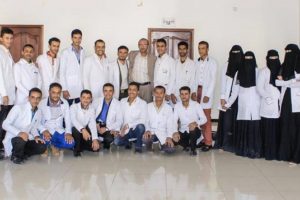ANU Medical Labs: A Principally Practical Discipline
ANU Medical Labs: A Principally Practical Discipline
A special attention is being paid by Al-Nasser University to practical training which is included as an educationally basic constituent in the departments’ programs. Much of emphasis is given to the development of the students’ practical skills and professional training so as to bridge the gap with the theoretical classes they study at college.
Medical Labs Department at FMS, Al-Nasser University, distinctly sets the practical as a basic requirement for awarding the degree. For six months, the student has to practice in training centers the actual job responsibilities in order to pass the related tests and thus get the degree.
According to Dr. Mukhtar El-Zumor, Head of ANU’s Medical Labs Department, students can gain the professional experience only from the practical work environment. They can effectively practice their future career and advance competency. The discipline helps students unleash their potential, improve skills, and practice study in real life.
Mr. Ahmed Mahoub, the Research & Training Officer, noted that a prior coordination has to be made with many training centers so that a student gets exposed to various environments and comes out with the maximum advantage.
The Medical Labs senior students were divided into four groups to receive training at: 48 Typical Hospital, Specialist New-Lab Center, National Center of Blood Transplantation & Research, El-Oulaqi Specialist Labs, and Republican Hospital Labs.
At the outset, the students are given the guidelines and regulations that they must follow during the internship period. They are also given lectures on the work mechanism at the respective training lab by being introduced to each section’s program, work instructions, and the safety measures when dealing with patients, specimens and waste.
Divided into groups, the students take turns working in the center’s different sections. First, they go to the reception where they learn how to receive patients, input information, and collect specimens to send them to the lab’s other sections.
Moving to the blood section, the students know how to make a total blood test and blood analysis checkups. In the blood bank section, they learn about examining blood type and Rhesus Factor, matching tests, blood transplantation, pre- and post-transplantation checkups, blood components and the methods of separating, storing, and transferring them to recipients.
In the biochemistry and clinical sections, the students learn how to test blood sugar, fat, protein, uric acid in addition to examining the functions of kidneys, heart, liver, pancreas, prostate, etc. They also practice taking the tests of uric acid, spinal cord liquid, sperm, etc. in the body fluids section. In the microbiology section, they further identify the methods of specimen analysis, implantation, and reading the results along with the confirming examinations. The other sections they get trained in include: viruses, parasites, microbes, hormones, and so on.
At each section, there is a keen emphasis on how specimens should be taken properly and noted down in the respective section’s register, when specimens have to be rejected, and which particular test to add to the analysis slice. Instructions are also given on how to handle the instruments, input specimens, output data, shut the device down, and then hand the results over to patients.
It is noteworthy that, Medical Lab Department at ANU has prepared a field training guide of which a copy is given to every trainee. The guide includes tables of all the tests to conduct, the ways they are conducted, and result discussion. At the end of training, the student’s status is reported based on his/her actual work recorded in the guide.
The students are evaluated by the training center’s supervisor along with a supervisor assigned by the department who visits the trainees regularly to inspect and report the results of their assignments. A weekly meeting is also held by the head of the department with students to discuss whatsoever relates to the training process.
A distinctive thing about ANU Medical Labs Department is that when the training period is completed the student has to pass a comprehensive training test in order to be awarded a training certificate from the University. In addition, separate experience certificates are given to students by the training centers.
![IMG-20171113-WA0027 [Alnasser]](http://www.al-edu.com/wp-content/uploads/2018/04/IMG-20171113-WA0027-Alnasser.jpg)
![IMG-20171115-WA0060 [Alnasser]](http://www.al-edu.com/wp-content/uploads/2018/04/IMG-20171115-WA0060-Alnasser.jpg)
![IMG-20171115-WA0058 [Alnasser]](http://www.al-edu.com/wp-content/uploads/2018/04/IMG-20171115-WA0058-Alnasser.jpg)
![IMG-20171115-WA0062 [Alnasser]](http://www.al-edu.com/wp-content/uploads/2018/04/IMG-20171115-WA0062-Alnasser.jpg)
![IMG-20171116-WA0003 [Alnasser]](http://www.al-edu.com/wp-content/uploads/2018/04/IMG-20171116-WA0003-Alnasser.jpg)
![IMG-20180410-WA0061 [Alnasser]](http://www.al-edu.com/wp-content/uploads/2018/04/IMG-20180410-WA0061-Alnasser.jpg)
![IMG-20171113-WA0017 [Alnasser]](http://www.al-edu.com/wp-content/uploads/2018/04/IMG-20171113-WA0017-Alnasser.jpg)
![IMG-20180311-WA0009 [Alnasser]](http://www.al-edu.com/wp-content/uploads/2018/04/IMG-20180311-WA0009-Alnasser.jpg)
![IMG-20171115-WA0045 [Alnasser]](http://www.al-edu.com/wp-content/uploads/2018/04/IMG-20171115-WA0045-Alnasser.jpg)
![IMG-20180315-WA0002 [Alnasser]](http://www.al-edu.com/wp-content/uploads/2018/04/IMG-20180315-WA0002-Alnasser.jpg)
![IMG-20180315-WA0007 [Alnasser]](http://www.al-edu.com/wp-content/uploads/2018/04/IMG-20180315-WA0007-Alnasser.jpg)
![IMG-20180410-WA0032 [Alnasser]](http://www.al-edu.com/wp-content/uploads/2018/04/IMG-20180410-WA0032-Alnasser.jpg)
![IMG-20180201-WA0001 [Alnasser]](http://www.al-edu.com/wp-content/uploads/2018/04/IMG-20180201-WA0001-Alnasser.jpg)
![IMG-20171115-WA0051 [Alnasser]](http://www.al-edu.com/wp-content/uploads/2018/04/IMG-20171115-WA0051-Alnasser.jpg)
![IMG-20180410-WA0049 [Alnasser]](http://www.al-edu.com/wp-content/uploads/2018/04/IMG-20180410-WA0049-Alnasser.jpg)
![IMG-20180410-WA0058 [Alnasser]](http://www.al-edu.com/wp-content/uploads/2018/04/IMG-20180410-WA0058-Alnasser.jpg)
![IMG-20180410-WA0021 [Alnasser]](http://www.al-edu.com/wp-content/uploads/2018/04/IMG-20180410-WA0021-Alnasser.jpg)
![IMG-20180311-WA0005 [Alnasser]](http://www.al-edu.com/wp-content/uploads/2018/04/IMG-20180311-WA0005-Alnasser.jpg)
![IMG-20180315-WA0005 [Alnasser]](http://www.al-edu.com/wp-content/uploads/2018/04/IMG-20180315-WA0005-Alnasser.jpg)
![IMG_20180410_132404 [Alnasser]](http://www.al-edu.com/wp-content/uploads/2018/04/IMG_20180410_132404-Alnasser.jpg)
![IMG-20171115-WA0056 [Alnasser]](http://www.al-edu.com/wp-content/uploads/2018/04/IMG-20171115-WA0056-Alnasser.jpg)
![IMG-20171115-WA0049 [Alnasser]](http://www.al-edu.com/wp-content/uploads/2018/04/IMG-20171115-WA0049-Alnasser.jpg)
![IMG-20180410-WA0033 [Alnasser]](http://www.al-edu.com/wp-content/uploads/2018/04/IMG-20180410-WA0033-Alnasser.jpg)
![IMG-20180410-WA0023 [Alnasser]](http://www.al-edu.com/wp-content/uploads/2018/04/IMG-20180410-WA0023-Alnasser.jpg)
![IMG-20180311-WA0011 [Alnasser]](http://www.al-edu.com/wp-content/uploads/2018/04/IMG-20180311-WA0011-Alnasser.jpg)
![IMG-20180410-WA0044 [Alnasser]](http://www.al-edu.com/wp-content/uploads/2018/04/IMG-20180410-WA0044-Alnasser.jpg)
![IMG-20180410-WA0036 [Alnasser]](http://www.al-edu.com/wp-content/uploads/2018/04/IMG-20180410-WA0036-Alnasser.jpg)
![IMG-20171113-WA0011 [Alnasser]](http://www.al-edu.com/wp-content/uploads/2018/04/IMG-20171113-WA0011-Alnasser.jpg)
![IMG-20171109-WA0014 [Alnasser]](http://www.al-edu.com/wp-content/uploads/2018/04/IMG-20171109-WA0014-Alnasser.jpg)
![IMG-20171109-WA0027 [Alnasser]](http://www.al-edu.com/wp-content/uploads/2018/04/IMG-20171109-WA0027-Alnasser.jpg)
![IMG-20171109-WA0024 [Alnasser]](http://www.al-edu.com/wp-content/uploads/2018/04/IMG-20171109-WA0024-Alnasser.jpg)
![IMG-20180410-WA0047 [Alnasser]](http://www.al-edu.com/wp-content/uploads/2018/04/IMG-20180410-WA0047-Alnasser.jpg)
![IMG-20180410-WA0038 [Alnasser]](http://www.al-edu.com/wp-content/uploads/2018/04/IMG-20180410-WA0038-Alnasser.jpg)
Search
News

تنفيذ الاختبارات العملية لطلاب الهندسة المدنية مستوى رابع بجامعة الناصر
نفذ طلاب المستوى الرابع هندسه مدنيه إختبار الجا...
المؤتمر العلمي الأول : رئيس مجلس الوزراء يلتقي اللجنة الإشرافية للمؤتمر العلمي الأول للجامعات اليمنية ” ط.. وفان الأق.. صى
أكد رئيس مجلس الوزراء الأستاذ أحمد غالب الرهوي،...
رئيس جامعة الناصر يفتتح المعرض التقني الرابع لطلبة “تقنية المعلومات” وسط ابتكارات طلابية مدهشة
أفتتح الأستاذ الدكتور عبد الله حسين طاهش رئيس ج...
شبكة أخبار التعليم تُكرم رئيس جامعة الناصر الدكتور عبد الله طاهش بـ “شهادة التميز”
كرمت الشبكة اليمنية لأخبار التعليم، اليوم، رئيس...
قسم الهندسة المدنية بجامعة الناصر ينفذ نزولاً ميدانياً علمياً للمستوى الأول والثاني
نفذ طلاب قسم الهندسة المدنية – المستوى ال...

